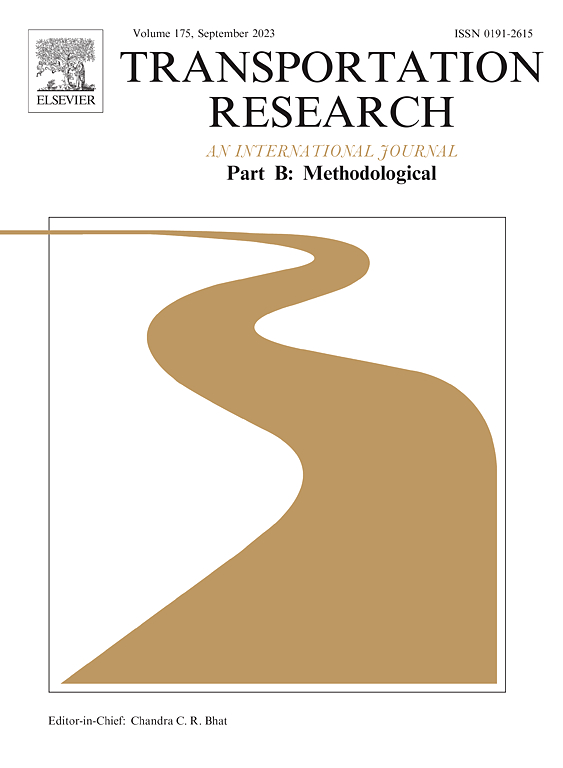用于道路使用者收费的新型流动性消费理论
IF 5.8
1区 工程技术
Q1 ECONOMICS
引用次数: 0
摘要
基于电能和机动性之间的类比,我们提出了一种新的机动性消耗理论,其基础是车辆在行驶过程中所需的预留空间。在这一理论中,移动性由道路基础设施 "生产",并由驾驶员 "消耗",这与发电厂生产电能并由电气设备消耗电能的方式类似。计算流动性消耗只需要输入行驶距离和行驶时间,以及两个现成的物理参数,即车辆长度和反应时间。我们认为,流动性消耗是一种比单纯的旅行距离(或旅行时间)更全面的道路使用测量方法,因为它同时捕捉了空间和时间上的道路使用情况。我们在本研究中探讨的流动性消耗理论的一个应用领域是道路使用者收费。我们建议将流动性消耗作为新收费方案的基础,我们称之为基于流动性的收费。在两个案例研究中,我们比较了基于流动性的收费和基于距离的收费的影响。在一个简单的瓶颈模型中,如果只考虑出发时间的选择,我们会发现,与基于距离的收费不同,基于流动性的收费可以减少拥堵,类似于拥堵定价方案。此外,当考虑路线选择时,我们发现基于距离的收费会加剧拥堵,因为它会鼓励驾驶员通过容量低的路线抄近路,而基于机动性的收费则能缓解这种影响。所提出的基于流动性的收费方案还能进一步考虑车辆自动化和碳排放收费方面的技术创新。本文章由计算机程序翻译,如有差异,请以英文原文为准。
A novel mobility consumption theory for road user charging
Building on the analogy between electrical energy and mobility, we propose a novel mobility consumption theory based on the idea of the required reserved space headway of vehicles while driving. In this theory, mobility is “produced” by road infrastructure and is “consumed” by drivers in a similar fashion to power that is produced in power plants and consumed by electrical devices. The computation of mobility consumption only requires travel distance and travel time as input, as well as two physical parameters that are readily available, namely vehicle length and reaction time. We argue that mobility consumption is a more comprehensive measure for road use than travel distance (or travel time) alone as it captures road use over both space and time. One application area for our mobility consumption theory that we look at in this study is road user charging. We propose mobility consumption as the basis of a new charging scheme, which we refer to as mobility-based charging. Impacts of mobility-based charging and distance-based charging are compared in two case studies. When considering only departure time choice in a simple bottleneck model, we show that mobility-based charging can reduce congestion akin a congestion pricing scheme, unlike distance-based charging. Further, when considering route choice, we show that distance-based charging can increase congestion as it encourages drivers to take shortcuts through routes with low capacity, while mobility-based charging mitigates this effect. The proposed mobility-based charging scheme is further capable of considering technological innovation in vehicle automation and carbon charging.
求助全文
通过发布文献求助,成功后即可免费获取论文全文。
去求助
来源期刊
CiteScore
12.40
自引率
8.80%
发文量
143
审稿时长
14.1 weeks
期刊介绍:
Transportation Research: Part B publishes papers on all methodological aspects of the subject, particularly those that require mathematical analysis. The general theme of the journal is the development and solution of problems that are adequately motivated to deal with important aspects of the design and/or analysis of transportation systems. Areas covered include: traffic flow; design and analysis of transportation networks; control and scheduling; optimization; queuing theory; logistics; supply chains; development and application of statistical, econometric and mathematical models to address transportation problems; cost models; pricing and/or investment; traveler or shipper behavior; cost-benefit methodologies.

 求助内容:
求助内容: 应助结果提醒方式:
应助结果提醒方式:


